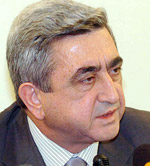– Mr. President, discussions over the peaceful resolution of the NK conflict recently have intensified, different opinions are being voiced, and different forecasts are made. What is the real situation today?
– The real situation is that after a prolonged passive phase the process of the NK conflict resolution has entered the active phase. This is stipulated by at least two important factors: The presidential elections in both Armenia and Azerbaijan have been completed. And the second factor: after the well-known events that took place in the region, it became clear that there is no military solution to the problem.
The resolution of the NK problem is possible, if Azerbaijan recognizes the right of the people of Nagorno Karabakh for self-determination, if Nagorno Karabakh has a land border with the Republic of Armenia, and if international organizations and the leading powers of the world guarantee the security of the NK people.
I think that the active phase is good, the public discussions are useful, and I truly believe that we haven’t yet reached the time of very active public discussions. Discussions are always helpful; however they must be based on one and only one interest – interest of the Armenian people. We have sacrificed way too much for the resolution of the NK problem for us just to turn a blind eye or disregard the attempts to make use of the issue.
We are resolving a dear issue. We are resolving an important historical issue, and in the process of its resolution if someone is trying to find some other interest, it is simply immoral.
– Mr. President, judging from the recent developments, greater involvement of other regional players becomes pretty obvious. I mean, in particular, the initiative of the Russian President Dmitri Medvedev to organize a meeting between the three Presidents, as well as the statement made by President Gul of Turkey that you had allegedly asked for the assistance in this conflict’s resolution. How would you comment on this?
– First of all, I would like to say that the NK peace process is conducted in the framework of the OSCE Minsk Group, based on the “Madrid principles”.
It’s been said more than once and I say it now: there is no other way. The only mediators are the Co-Chairs of the Minsk Group and the confusion that someone is trying to create does not help us at all. I repeat, the only mediators are the Co-Chairs of the Minsk Group, and Armenia has never requested any other state to become a mediator.
Russia is one of the Minsk Group Co-Chairs and President Medvedev’s invitation and his active stance are quite comprehensible.
As for the interpretation of President Gul’s remark, first of all I should say that you have probably noted that I am not inclined to interpreting the other leaders’ statements, particularly when our media produces extracts out of context.
The truth is that the only mediators are the OSCE Minsk Group Co-Chairs, however we do not refuse any help. Yes, I am confident that Turkey can bring its assistance to the resolution of the NK conflict and I think it brings it even now: the visit of President Gul to Yerevan, continuing Armenian-Turkish negotiations are a very good example of solving difficult issues. I am confident that if Turkey opens the borders and establishes diplomatic relations with Armenia it will assist greatly in the resolution of the NK problem.
– Mr. President, what is your evaluation of the combat readiness of our army?
– Our army is ready for combat. Today it is more ready than it was yesterday, and yesterday it was more ready than it had been the day before yesterday.
Armybuilding is a continuous, compound, and hard work which is based on devotion to the idea and the attitude that something new must be added every day. Every year our army adds to its armaments and its combat readiness, and also to its combat spirit, which is very important. This combat spirit is the most significant weapon and armament of our army.

